Alexander von Humboldt Museum Ludwig, Cologne, Germany. Until 27 January.
Prussian polymath and explorer Alexander von Humboldt’s 250th birthday rolls around this September. The ‘father of environmentalism’ is credited with envisioning geology, ecology and humanity as part of an interconnected web. Less well known is his role in early photography. In 1839, Humboldt was among the first established scientists to embrace the daguerreotype, invented by Louis-Jacques-Mandé Daguerre and Nicéphore Niépce. On show will be photo albums from Humboldt’s collection — one a present from British photographic innovator William Henry Fox Talbot; another with some of the first-known photographs of Mexico, Venezuela and Cuba.
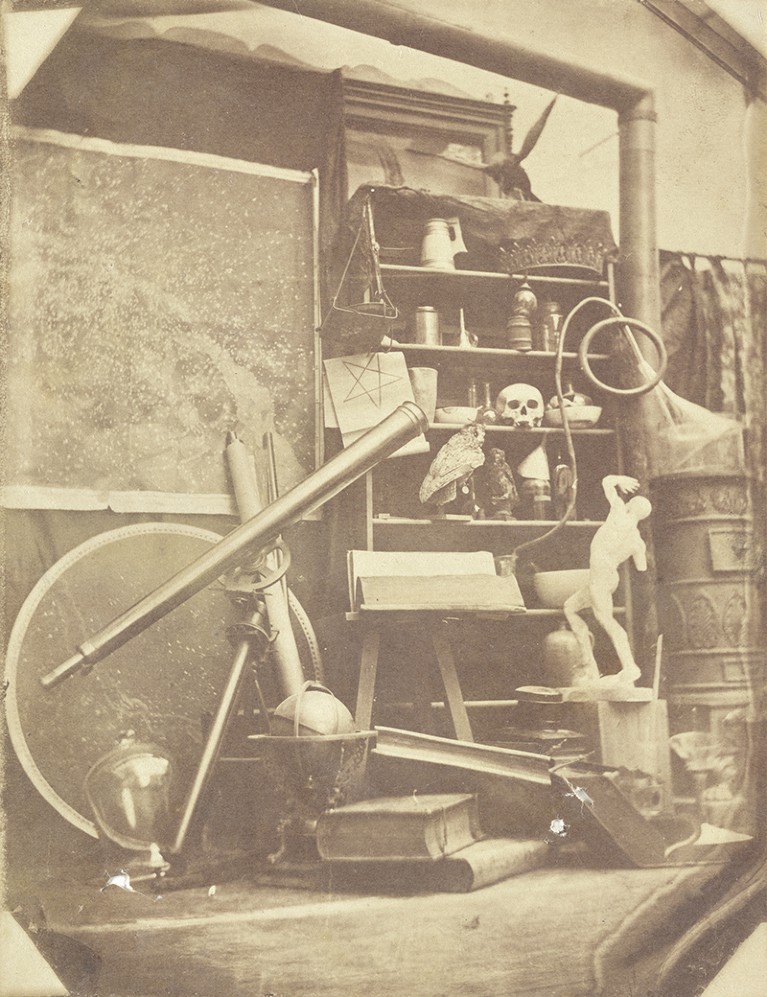
At the Astronomer’s (1853) by Hermann Krone, on display in the exhibition Alexander von Humboldt at the Museum Ludwig.Credit: Rheinisches Bildarchiv Köln
Sea Monsters Unearthed: Life in Angola’s Ancient Seas National Museum of Natural History, Washington DC. Until 2020.
Some 130 million years ago, the supercontinent Gondwana was being ripped apart, forming Africa and South America. The South Atlantic Ocean emerged between them. Today, Angola is a hotspot for tracking the sea’s biological record: it is the only African nation with known outcrops of fossil-bearing rocks from this period. In 2005, after decades of war, a major geological expedition reached the region. Projecto PaleoAngola unearthed a new dinosaur species, the long-necked sauropod Angolatitan adamastor; a host of sea turtles; and giant marine reptilian plesiosaurs and mosasaurs. Full-scale reconstructions and fossils will be on display at the US National Museum of Natural History. Meanwhile, the museum’s David H. Koch Hall of Fossils will open on 8 June with Deep Time, featuring 700 specimens and the return of a Tyrannosaurus rex fossil.
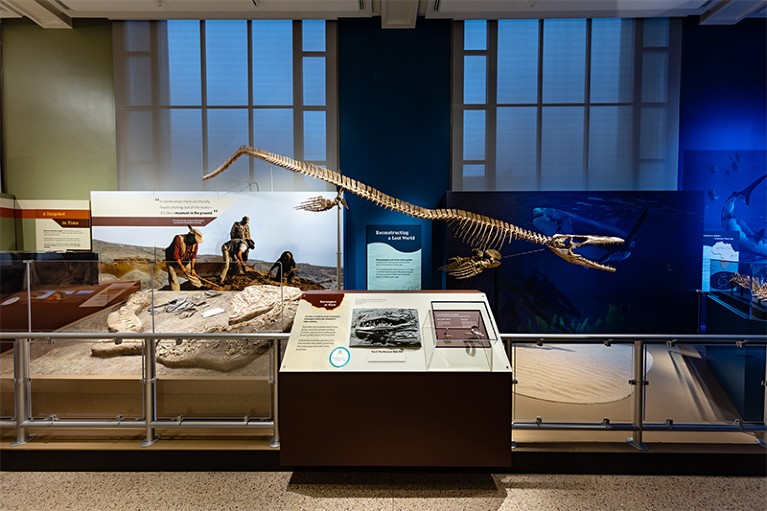
A reconstruction of the mosasaur Prognathodon kianda on display at the US National Museum of Natural History.Credit: Smithsonian
Microbiota: The Inside Story of Our Body’s Most Underrated Organ Cité des Sciences et de l’Industrie, Paris. Until July.
In 2014, microbiology student Giulia Enders penned a book on the digestive system, Gut (in her native German, Darm mit Charme, or ‘Charming Bowels’). The bestseller inspired this exhibition, produced with the French National Institute for Agricultural Research among other bodies, and with Enders’s input. The show (pictured below) echoes the book’s lighthearted approach to shadowy topics such as the workings of sphincters inner and outer, and the benefits of squatting for defecation.
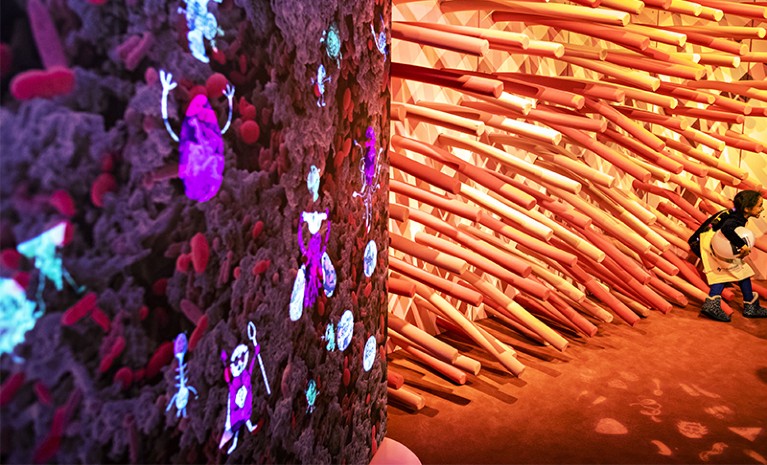
Credit: Philippe Levy/EPPDSCIPR
By the Light of the Silvery Moon National Gallery of Art, Washington DC. 28 April – 14 October.
On 20 July 1969, Apollo 11 delivered astronauts to the Moon for the first time. To mark the 50th anniversary, 50 lunar portraits spanning more than a century feature here. On show will be a stereograph of the Moon, taken by English astronomer Warren de la Rue in the 1850s; alongside will be close-up stereographs of the lunar surface by Neil Armstrong and Buzz Aldrin, and iconic photos from early uncrewed orbiters. Also on view will be French astronomer Charles Le Morvan’s 1914 photogravures (richly detailed etched copper plates produced from photographic negatives): an attempt to systematically map the visible lunar surface.
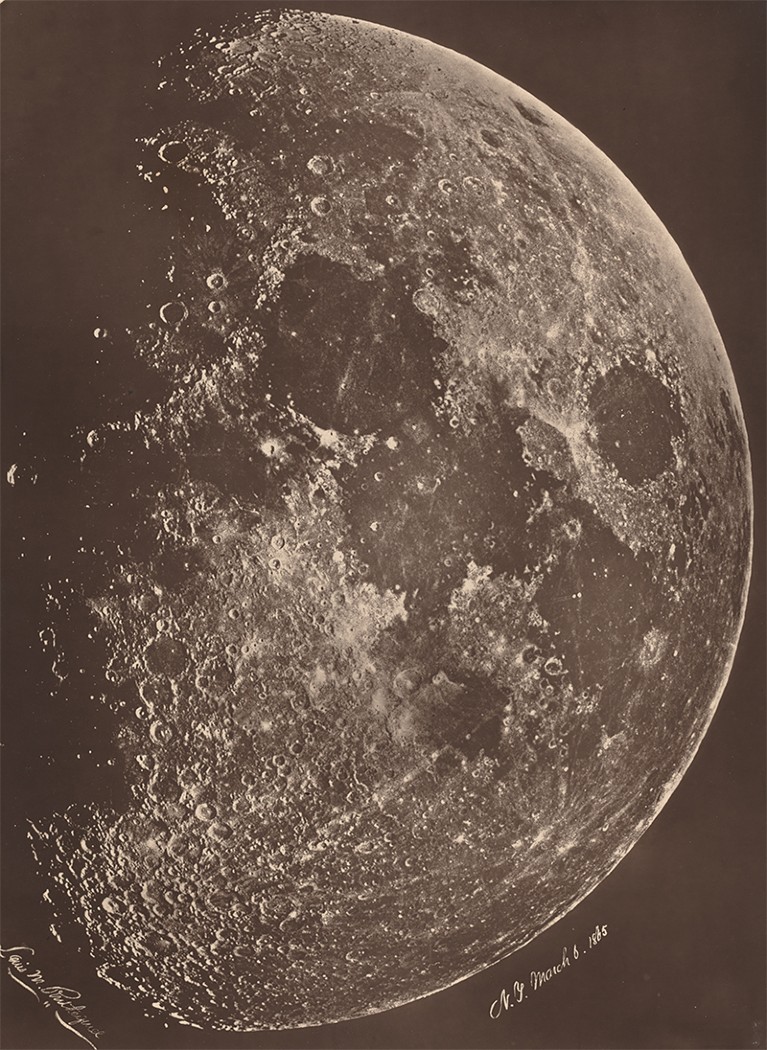
Photographie de la lune a son 1er Quartier (1865) by Lewis Rutherford.Credit: Natl. Gall. Art WA-USA
Food Victoria and Albert Museum, London. 18 May – 17 November.
How we gather, hunt, grow and process food has changed dramatically, from the invention of agriculture some 10,000 years ago to the creation of weight-loss supplements. This exhibition looks at the science and politics of what we eat, from urban farming to synthetic, lab-grown meat fibres and algae-coated spheres of water. New commissions and pieces from the museum’s collection will examine how we can make food more sustainable, tasty and ethically just.
Natalia Goncharova Tate Modern, London. 6 June – 8 September.
In the early twentieth century, Russian avant-garde artist Natalia Goncharova and her partner Mikhail Larionov developed rayonism — an artistic style drawing inspiration from contemporary scientific breakthroughs. The discoveries of X-rays and radioactivity prompted the artists to represent material reality beyond the reach of the human eye, through fractured shapes and dynamic lines representing light. Descriptions of a mystical ‘fourth dimension’ by Russian mathematician Peter Ouspensky in the early 1900s resonate in their work, too. Also on show will be Goncharova’s futurist body art, and set and clothing designs.
Total Solar Eclipse La Silla Observatory, Chile. 2 July, 16:39.
This year’s total solar eclipse will be visible only from South America and the Southern Pacific Ocean — a fitting moment for La Silla Observatory as it celebrates its first half-century. La Silla marks this portentous alignment with talks, tours and workshops for eclipse-chasers. The year is a big one for astronomy and physics in other ways, too. The International Astronomical Union turns 100, and May sees another centenary: that of astronomer Arthur Eddington’s momentous use of a total solar eclipse to secure the first experimental proof of Albert Einstein’s general theory of relativity.
Graffiti as Devotion along the Nile Kelsey Museum of Archaeology, Ann Arbor, Michigan. 23 August 2019 – 5 January 2020.
In Kush, an ancient kingdom in what is now Sudan, many pilgrims left their mark on temples and pyramids starting around 300 bc. Archaeologists examining the graffiti have found inscriptions in ancient Egyptian and Greek describing everything from festivals to diplomatic missions. This show explores hundreds of pieces of pictorial graffiti — including horses, a man with a bow and a giraffe — discovered in a rock-cut temple by Kelsey Museum archaeologists in El Kurru, northern Sudan.
The Future and Arts Mori Art Museum, Tokyo. 19 November 2019 – 29 March 2020.
Technology is intruding ever further into our everyday lives, from the artificial intelligence that guides smartphone voice activation to blockchains used to ‘mine’ cryptocurrency. This exhibition asks artists to reflect on what life might be like a few decades in the future — for better or for worse.
Medicine Galleries Science Museum, London. Opening in 2019.
At more than 3,000 square metres, these galleries will offer a permanent space for contemplation of the human body and health in London’s Science Museum. Some 2,500 artefacts from its archives, and those of the Wellcome Collection across town, will illuminate 500 years of medical history. A 3.5-metre sculpture will greet visitors — the work of Marc Quinn (best known for Self, a series of casts of his own head in frozen blood). Called Self-Conscious Gene, it portrays the late Canadian artist Rick Genest, who covered his body with tattoos of his skeleton and organs.
The Humboldt Forum Berlin Palace. Opening end of 2019.
Berlin’s massive, €595-million (US$674‑million) museum and event space is set to rival London’s British Museum. This ‘palace for all’ — named after naturalist Alexander von Humboldt and his diplomat brother Wilhelm — will house old and new collections, including those of the Ethnological Museum of Berlin and the Museum of Asian Art. The Humboldt Laboratory will be dedicated to showcasing research from the city’s Humboldt University.
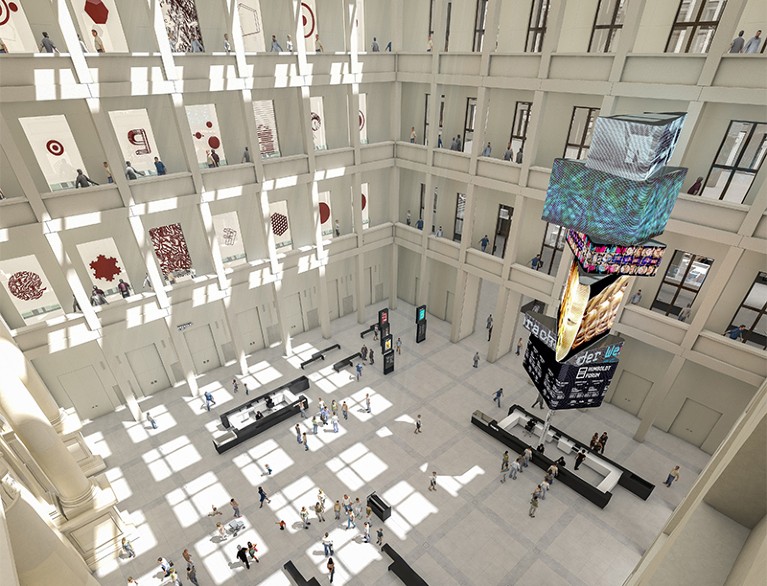
An artist’s impression of the Humboldt Forum in Berlin, opening in late 2019.Credit: Franco Stella, FS-HUF-PG/SHF

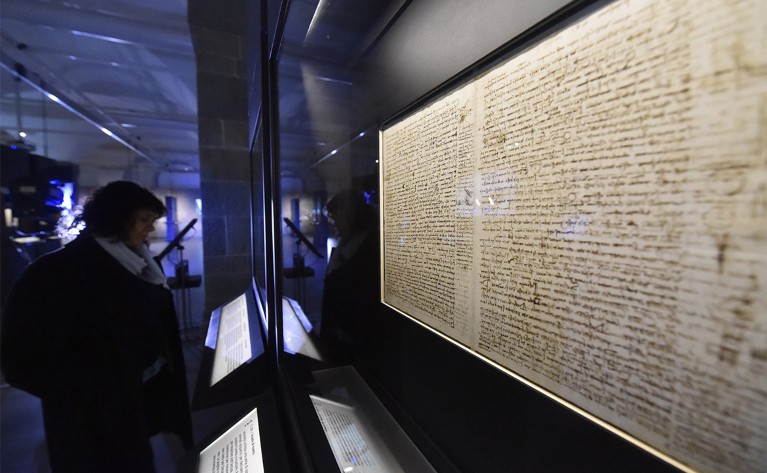
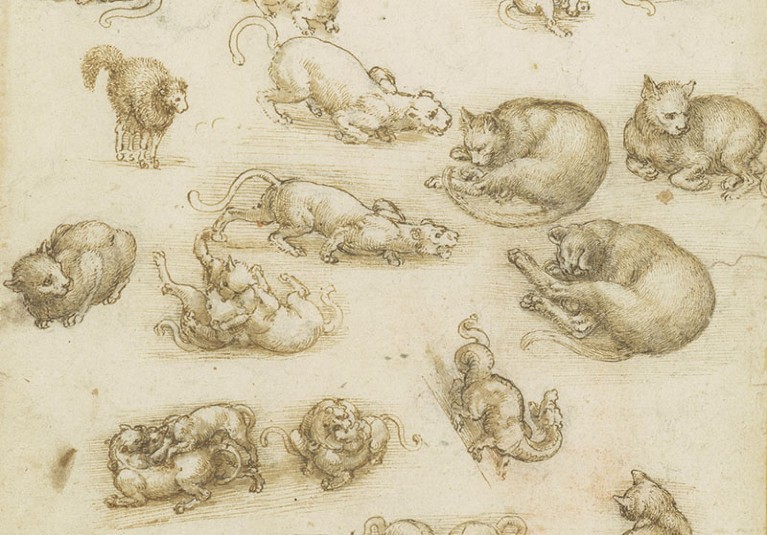
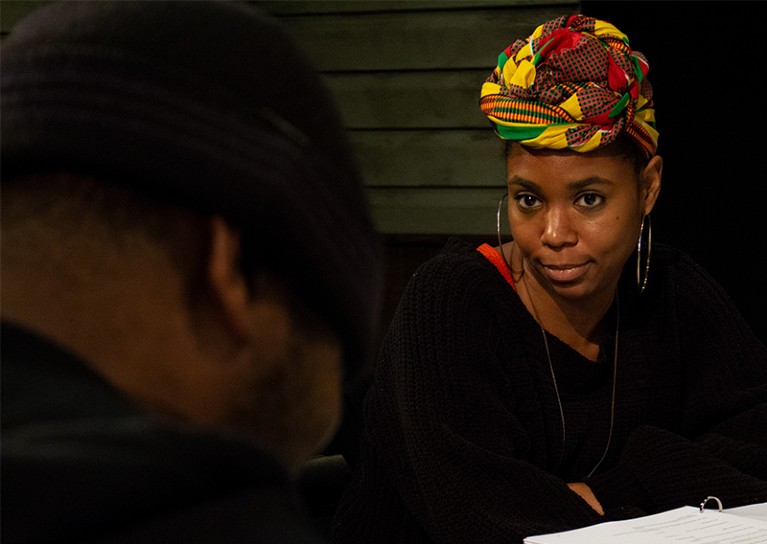
 Antarctic dinosaurs, fashion from fruit, NASA at 60 — hot tickets for 2018
Antarctic dinosaurs, fashion from fruit, NASA at 60 — hot tickets for 2018








